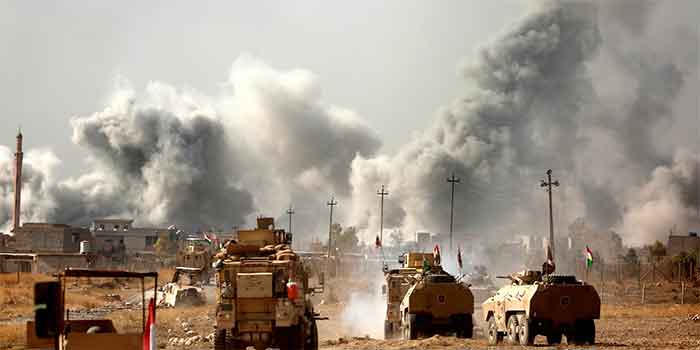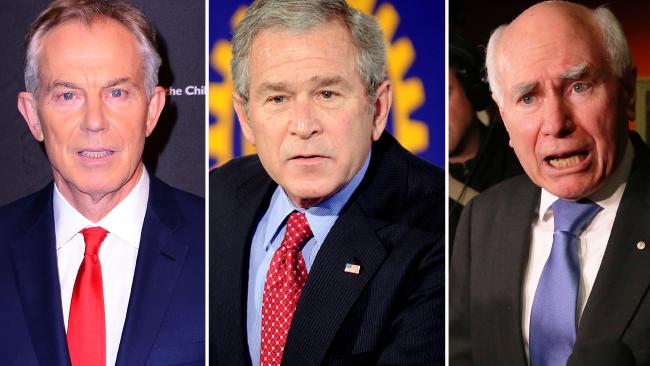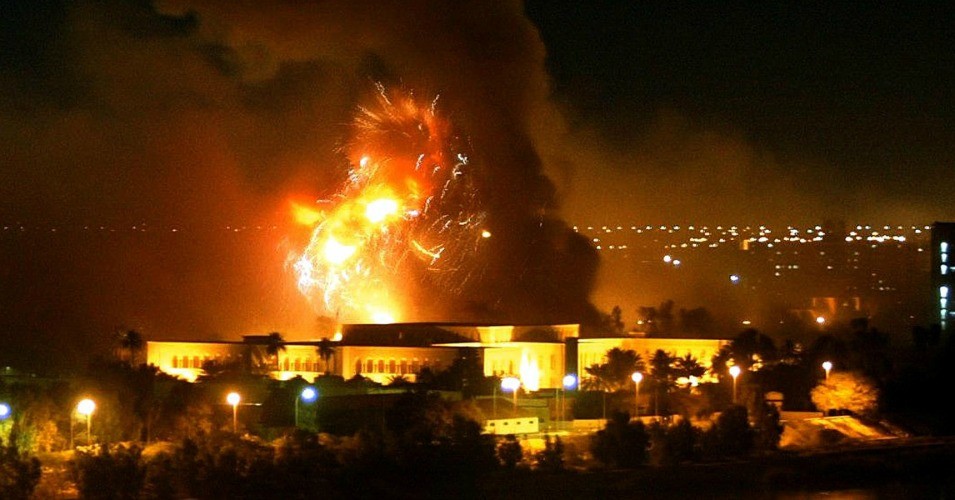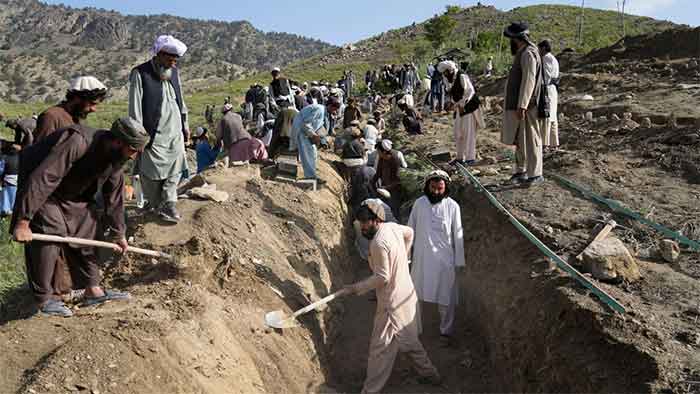
More facts on imperialist aggression on Iraq have come out. The imperialists knew that the aggression would destabilize the entire region.
Citing classified memo, media reports said:
As U.S. president George W. Bush pressed the case for war in Iraq in the summer of 2002, top State Department officials warned that an invasion to overthrow Iraqi President Saddam Hussein could spark internal Iraqi chaos, Middle East upheaval and threats to U.S. interests.
These have been found in formerly classified U.S. documents released this week.
“An effort to overthrow the regime in Baghdad could unravel if we’re not careful, intersecting to create a ’perfect storm’ for American interests,” three veteran diplomats with long experience in the Arab world wrote in a July 29, 2002, memo to Secretary of State Colin Powell. The White House ultimately ignored their warnings and the Bush administration invaded without detailed plans for post-war Iraq.
While the existence of this “Perfect Storm” memo has been reported previously, its contents had been secret.
The letter and more than 80 other formerly classified documents covering policy toward the Middle East, Russia and other regions were released in conjunction with the publication of “The Back Channel,” a memoir by former U.S. Deputy Secretary of State William Burns.
The Wall Street Journal (WSJ) has reported these formerly classified documents, now released.
The WSJ noted the 10-page memo predicted many setbacks that actually occurred: violence among Iraq’s Sunnis, Shiites, and Kurds; attacks on U.S. troops; intervention by Iran and other neighbors.
“This view would require planning to stay five years — maybe four if we’re lucky, ten if we’re not,” says the document, written by Burns, who then led the U.S. State Department’s Bureau of Near Eastern Affairs, and colleagues David Pearce and Ryan Crocker.
In exchanges between officials, from August 2002, it was obvious to U.S. diplomats that the decision to invade Iraq was a mistake. “This is not about whether the goal of regime change makes sense; it’s about choosing between a smart way and a dumb way of bringing it about,” Burns wrote in an Aug. 16, 2002, email to Powell.
During George W. Bush’s first term and the U.S invasion to Iraq, Elliot Abrams served as Special Assistant to the President and Senior Director on the National Security Council for Near Eastern and North African Affairs.
U.S. military forces invaded Iraq in March 2003, easily toppled Saddam Hussein’s government. Then, the invading U.S. forces quickly finding themselves trapped in a bloody sectarian war. U.S. combat troops remained until 2011 and some returned in 2014 to help Iraq fend off a surging Islamic State.
In an interview, Mr. Burns said the July 2002 memo was intended “to try to puncture what we saw to be incredibly rosy assumptions” by the war’s advocates about an invasion’s aftermath.
Representatives for Mr. Bush and former White House national security adviser Condoleezza Rice did not respond to requests for comment on the contents of the released memo. Senior Bush administration officials have defended the decision to invade Iraq, while acknowledging mistakes took place.
“Despite the intelligence failures and other mistakes he has acknowledged previously, President Bush continues to believe the whole world is better off without Saddam Hussein in power,” a spokesperson for Mr. Bush said in 2016.
Other potential calamities contained in what Mr. Burns called the State Department trio’s “hurried list of horribles” didn’t occur, including Mr. Hussein’s use of chemical weapons — which proved nonexistent—and a massive Turkish military intervention into Iraq’s predominantly Kurdish northern region.
As Mr. Burns notes in his book, State Department officials never argued directly against regime change in Iraq. Rather, they warned of possible consequences and argued that the U.S. needed maximum international support before a preemptive strike on Mr. Hussein.
“My biggest professional regret looking back is that even though we tried to be honest about our concerns…I didn’t push back as hard as I could have or should have” against going to war, said the retired diplomat, who is now president of the Carnegie Endowment for International Peace.
While Mr. Powell shared his aides’ concerns with Mr. Bush and Ms. Rice, by August 2002 it was obvious to U.S. diplomats that the debate over going to war was essentially over.
“This is not about whether the goal of regime change makes sense; it’s about choosing between a smart way and a dumb way of bringing it about,” Mr. Burns wrote in an August 16, 2002, email to Mr. Powell.
A third document, dated November 19, 2001, suggests the Defense Department was arguing for a strike on Iraq barely two months after the September 11, 2001, terrorist attacks on the U.S.
“DoD (the U.S. Department of Defense) will likely argue the campaign in Afghanistan should serve as a model for Iraq — dissimilarities be damned and ignored,” Mr. Burns wrote to superiors.
Mr. Burns, who played a key role in the Obama administration’s initially secret outreach to Iran, said the Iraq experience offers lessons as U.S. President Donald Trump heightens confrontation with Iran.
Mr. Trump has said he would be willing to negotiate with Tehran but has issued stern warnings that Iran risks harsh consequences by confronting the U.S.
Other reports also revealed more facts:
On September 9, 2002, as the George W. Bush administration was launching its campaign to invade Iraq, a classified report landed on the desk of the chairman of the Joint Chiefs of Staff. It came from Defense Secretary Donald Rumsfeld, and it carried an ominous note.
“Please take a look at this material as to what we don’t know about WMD,” Rumsfeld wrote to Air Force General Richard Myers. “It is big.”
The report was an inventory of what U.S. intelligence knew — or more importantly didn’t know — about Iraqi weapons of mass destruction. Its assessment was blunt: “We’ve struggled to estimate the unknowns. … We range from 0% to about 75% knowledge on various aspects of their program.”
Myers already knew about the report. The Joint Staff’s director for intelligence had prepared it, but Rumsfeld’s urgent tone said a great deal about how seriously the head of the Defense Department viewed the report’s potential to undermine the Bush administration’s case for war. But he never shared the eight-page report with key members of the administration such as then-Secretary of State Colin Powell or top officials at the CIA, according to multiple sources at the State Department, White House and CIA who agreed to speak on condition of anonymity. Instead, the report disappeared, and with it a potentially powerful counter-narrative to the administration’s argument that Saddam Hussein’s nuclear, chemical and biological weapons posed a grave threat to the U.S. and its allies, which was beginning to gain traction in major news outlets, led by the New York Times.
While the threat posed by a nuclear-armed Iraq was at the heart of the administration’s case for war, the JCS report conceded: “Our knowledge of the Iraqi (nuclear) weapons program is based largely — perhaps 90% — on analysis of imprecise intelligence.”
The rationale for the invasion has long since been discredited, but the JCS report, now declassified, which a former Bush administration official forwarded in December, nevertheless has implications for both sides in the 2016 presidential race, in particular the GOP candidates who are relying for foreign policy advice on some of the architects of the war, and the Democratic front-runner, who once again is coming under fire from her primary opponent for supporting the invasion.
Then-Deputy Defense Secretary Paul Wolfowitz, whose military assistant was on the short list of people copied on the JCS report, is one of Jeb Bush’s foreign policy experts. Other supporters of the war, though they do not appear to have been aware of the JCS report, are involved in the various advisory roles in the 2016 campaign. John Bolton, former U.S. ambassador to the United Nations, is advising Ted Cruz; and Elliott Abrams and William Kristol are supporting Marco Rubio, whom Reuters reported is also briefed regularly by former Cheney adviser Eric Edelman.
The conflict has claimed the lives of 4,500 Americans and some 165,000 Iraqis.
Rumsfeld was not under any legal or administrative obligation to circulate an internal DoD report, but not doing so raises questions about whether the administration withheld key information that could have undermined its case for war.
On August 16, 2002, Rumsfeld asked Air Force Maj. Gen. Glen Shaffer, head of the Joint Staff’s intelligence directorate, “what we don’t know (in a percentage) about the Iraqi WMD program,” according to a Sept. 5 memo from Shaffer to Myers and three other senior military officials.
On September 5, Shaffer sent Myers his findings, titled “Iraq: Status of WMD Programs.” In a note to his boss, he revealed: “We don’t know with any precision how much we don’t know.”
















































